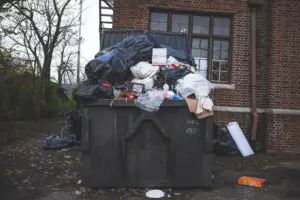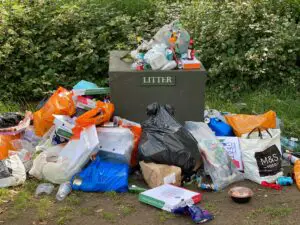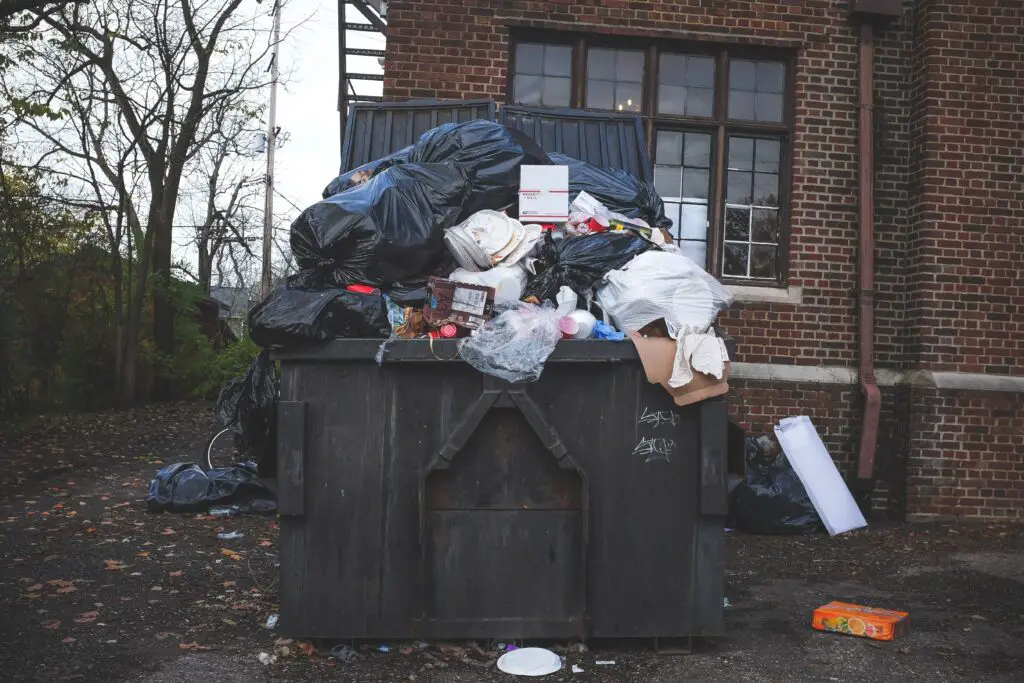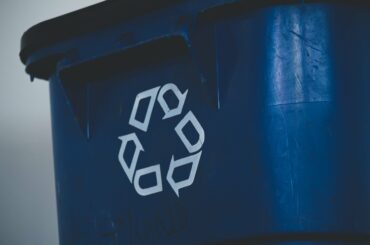Neglecting recycling, a fundamental practice in the pursuit of sustainability can have dire consequences for our environment and future generations. When we don’t recycle, valuable resources are depleted, energy consumption rises, and pollution levels soar. The repercussions of not recycling are significant and demand our attention. Understanding these consequences highlights the urgency and imperative of incorporating recycling into our daily lives, as it is essential for fostering a sustainable and harmonious relationship with our planet.
Contents
Increased Waste Generation
The absence of recycling paves the way for a concerning surge in waste generation, exacerbating the already daunting challenge of waste management. Without recycling, materials that could have been repurposed and given a new life are discarded as waste, resulting in a significant accumulation of non-biodegradable materials. This accumulation strains our landfills and incinerators, which are ill-equipped to handle such vast quantities of waste.
Landfills, designated sites for waste disposal, are pushed to their limits as more waste is directed toward them. The sheer volume of waste consumes valuable land and emits harmful greenhouse gases and toxic substances into the surrounding environment. This contamination poses severe threats to human health and ecosystems, compromising the quality of air, soil, and water quality.
Incinerators, often employed as an alternative to landfills, face similar challenges. The increased waste load necessitates more incineration, which leads to higher energy consumption and greater emissions of pollutants. Harmful substances released during incineration, such as dioxins and heavy metals, can harm human health and contribute to air pollution.
The accumulation of waste also gives rise to environmental and health risks. Landfills and poorly managed waste disposal sites can contaminate groundwater and nearby water bodies, potentially affecting the safety of drinking water sources and aquatic ecosystems. The release of methane, a potent greenhouse gas, further contributes to climate change and global warming. Moreover, decomposing waste produces unpleasant odors and attracts pests, posing additional challenges to public health and quality of life.
By understanding the consequences of not recycling, we can grasp the urgency of diverting waste from landfills and incinerators through sustainable waste management practices. Implementing effective recycling programs becomes imperative to alleviate the strain on waste disposal systems, minimize pollution, and safeguard the environment and human well-being.
Resource Depletion
Without recycling, the depletion of valuable resources becomes an alarming concern. The production of goods heavily relies on the extraction and utilization of finite resources such as metals, plastics, paper, and timber. However, without effective recycling practices, these resources are used once and then discarded, resulting in their permanent loss and the need for constant extraction of virgin materials.
Recycling is crucial in conserving resources by transforming waste into new products. Through recycling, materials are diverted from the waste stream and reprocessed into usable materials. This process significantly reduces the demand for virgin resources, as recycled materials can often be used as manufacturing substitutes. Incorporating recycled materials into the production cycle diminishes the need for extracting raw resources, alleviating the strain on ecosystems.
Increased resource extraction due to the absence of recycling has wide-ranging consequences. The extraction of natural resources often involves disruptive activities such as mining, deforestation, and habitat destruction. These activities compromise the integrity of ecosystems and lead to the loss of biodiversity and the disruption of delicate ecological balances.
Additionally, resource extraction contributes to environmental degradation through the emission of greenhouse gases, the destruction of natural landscapes, and air and water pollution. The extraction process can involve energy-intensive operations, further exacerbating carbon emissions and climate change.
Environmental Pollution
The lack of recycling contributes significantly to environmental pollution, resulting in dire consequences for our planet and all its inhabitants. Without effective recycling practices, various forms of pollution arise, posing significant challenges to ecosystems, climate stability, and human health.
One of the most critical aspects of pollution associated with the absence of recycling is the release of greenhouse gases (GHGs). When waste decomposes in landfills or undergoes incineration, it generates methane, a potent GHG that contributes to climate change. Methane emissions have a significantly higher warming potential compared to carbon dioxide. Therefore, the accumulation of waste in landfills and the increased incineration of waste without recycling amplify GHG emissions, exacerbating global warming and climate instability.
Improper waste disposal methods, such as illegal dumping or inadequate waste management systems, contaminate land, water bodies, and the air we breathe. Landfills, when not properly designed or maintained, can leak harmful substances into the soil, seeping into groundwater and contaminating drinking water sources. The contamination of water bodies with pollutants from waste can harm aquatic ecosystems, disrupting delicate ecological balances and threatening biodiversity.
Air pollution is another consequence of improper waste disposal. The incineration of waste without recycling releases toxic substances and pollutants into the atmosphere, contributing to air pollution. Harmful emissions such as dioxins, heavy metals, and particulate matter can harm human health, causing respiratory problems and other related illnesses. Furthermore, burning waste without adequate control measures releases pollutants that contribute to smog formation and air quality degradation.
The environmental pollution resulting from the lack of recycling calls for urgent action. By embracing recycling, we can significantly reduce GHG emissions, mitigate climate change, and protect the environment from contamination. Effective recycling practices ensure that valuable resources are conserved, waste is properly managed, and pollution is minimized, creating a healthier and more sustainable planet for future generations.
Economic Implications
The absence of recycling has significant economic implications, affecting waste management costs, resource extraction expenses, and the potential for job creation and economic growth. Failing to embrace recycling as a fundamental practice hampers economic efficiency and sustainability.
Not recycling leads to increased costs in waste management. Without recycling, more waste is directed to landfills or incinerators, with substantial expenses. Landfills require land acquisition, construction, and ongoing maintenance, while incineration involves higher energy consumption and emissions control measures. The financial burden of managing the growing waste stream without recycling can strain local governments and waste management agencies, potentially resulting in increased fees and taxes for individuals and businesses.
Resource extraction costs rise in the absence of recycling. Without recycling, the demand for virgin materials remains high, necessitating continuous extraction of natural resources. Extracting raw materials involves significant expenses, including exploration, extraction operations, transportation, and processing. The increased resource extraction without recycling exacerbates environmental degradation, further impacting economic sustainability in the long run.
The lack of recycling also means missed opportunities for job creation and economic growth. The recycling industry has the potential to generate employment across various stages, from collection and sorting to processing and manufacturing. Recycling facilities and related industries contribute to local economies by creating jobs, supporting small businesses, and fostering innovation. By not fully embracing recycling, we overlook the chance to develop a robust and sustainable recycling sector to stimulate economic growth and improve communities.
Additionally, recycling offers economic benefits through resource conservation and energy efficiency. By reusing materials, recycling reduces the need for costly resource extraction, processing, and transportation. It also conserves energy by using recycled materials in manufacturing processes, requiring less energy than producing goods from virgin materials. These economic advantages contribute to cost savings, resource efficiency, and a more sustainable economic model.
To unlock the full economic potential, it is crucial to recognize the benefits of recycling and invest in recycling infrastructure, education, and awareness programs. By doing so, we can create a circular economy that maximizes resource utilization, minimizes waste, and fosters job creation and economic prosperity while preserving the environment.
Habitat Destruction and Biodiversity Loss
The absence of recycling contributes to habitat destruction, posing a severe threat to ecosystems and the delicate balance of biodiversity. Failing to recycle means continued reliance on resource extraction, often involving destructive practices encroaching upon natural habitats.

The extraction of raw materials, such as mining and deforestation, results in the destruction and fragmentation of habitats. These activities disrupt ecosystems by removing essential vegetation, altering landscapes, and displacing wildlife populations. Without recycling, the demand for virgin resources remains high, perpetuating the cycle of habitat destruction and further reducing available habitats for countless species.
The impact on ecosystems is significant when recycling is neglected. Ecosystems are intricate webs of interdependencies where each species plays a crucial role in maintaining balance and functionality. When habitats are destroyed, species lose their homes and face challenges finding suitable alternatives. This disruption can lead to a decline in biodiversity as species struggle to adapt, suffer from reduced food availability, and face increased resource competition.
Biodiversity loss resulting from the absence of recycling has far-reaching consequences. Biodiversity is not only essential for the preservation of individual species but also crucial for the overall health and resilience of ecosystems. The loss of biodiversity disrupts ecological processes, impairs ecosystem services, and decreases the capacity of ecosystems to withstand environmental changes. This loss threatens the stability and functioning of ecosystems and jeopardizes the well-being of all life forms, including humans.
Preserving natural habitats through recycling is of utmost importance. Recycling and reducing the demand for virgin resources can minimize habitat destruction and protect ecosystems. Recycling helps conserve resources, lessens the need for destructive extraction practices, and reduces pressure on habitats. By embracing recycling, we can contribute to preserving biodiversity, supporting ecosystem recovery, and safeguarding the intricate balance of life on Earth.
Health Risks
Improper waste disposal, resulting from the absence of recycling, poses significant health risks to humans and the environment. When waste is not managed appropriately, it can lead to detrimental consequences that compromise public health.
One of the primary health risks associated with improper waste disposal is the release of toxic substances into the environment. Hazardous chemicals and pollutants in various types of waste can leach into the soil, groundwater, and surface water, contaminating these vital resources. These toxins can find their way into the food chain, ultimately reaching humans through consuming contaminated food and water. Prolonged exposure to such contaminants can lead to various health issues, including organ damage, developmental disorders, and increased cancer risk.
In addition to toxic substances, improper waste disposal can contribute to the proliferation of disease-carrying vectors. Waste not properly contained or managed attracts pests such as rodents, flies, and mosquitoes, which can transmit harmful diseases to humans. The accumulation of waste in open areas or water bodies provides breeding grounds for these vectors, increasing the risk of infectious diseases such as dengue fever, malaria, and cholera.
The importance of recycling becomes evident when considering public health. Recycling is crucial in minimizing the amount of waste in landfills or improperly disposed of. By diverting waste from these avenues, recycling reduces the potential for toxic substances to contaminate the environment and pose health risks to communities.
Recycling also promotes the proper management and disposal of hazardous materials. Many electronic devices, for example, contain toxic components such as lead, mercury, and cadmium. When improperly discarded, these substances can seep into the environment and significantly threaten human health. Recycling electronic waste ensures that these toxic materials are safely extracted and disposed of, minimizing the risk of exposure and contamination.
Moreover, recycling reduces the need for resource extraction and energy-intensive production processes, leading to overall environmental improvements. A cleaner environment improves air quality, reduces pollution, and improves public health outcomes.
Recognizing the importance of recycling in protecting public health is crucial for building sustainable communities. By prioritizing recycling and implementing effective waste management practices, we can minimize the health risks associated with improper waste disposal, create healthier environments, and ensure the well-being of present and future generations.
What will happen if we don’t recycle?
In conclusion, the absence of recycling has far-reaching consequences that impact various aspects of our lives and the environment. Throughout this article, we have explored the importance of recycling and the significant negative consequences that arise when it is neglected.

We have seen how the lack of recycling leads to increased waste generation, putting a strain on landfills and incinerators and posing risks to human health and the environment. Resource depletion becomes a concern as valuable materials are wasted instead of reused, leading to increased extraction and environmental degradation. Environmental pollution, including releasing greenhouse gases and contaminating land, water bodies, and air, further exacerbates climate change and threatens ecosystems.
The economic implications of not recycling include the following:
- Increased waste management and resource extraction costs.
- Missed opportunities for job creation.
- Economic growth in the recycling industry.
Additionally, habitat destruction and biodiversity loss result from the continued reliance on resource extraction, disrupting ecosystems and compromising the delicate balance of life.
Moreover, improper waste disposal presents significant health risks, from releasing toxic substances into the environment to the proliferation of disease-carrying vectors. Recycling emerges as a crucial solution to protect public health by reducing the contamination of the environment and ensuring proper management of hazardous materials.
Considering these key points, it is evident that urgent action is needed to promote recycling and mitigate the negative consequences of not recycling. It is a collective responsibility for individuals, communities, and policymakers to embrace recycling as a fundamental practice for a sustainable future.
More Posts :
Revamp Your Outdoor Space: Master the Art of Laying Gravel Over Grass with Style and Ease in 2023
Unveiling the Significance of Recycling: A Sustainable Solution for 2023 and Beyond





